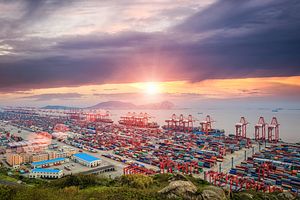A strong rally today notwithstanding, China’s stock shock has wiped trillions of dollars from market valuations, triggering the biggest correction in global markets since the European sovereign debt crisis of 2011. For sharemarket “bears” though, it is only the latest in the numerous risks facing a sluggish global economy.
After a “Black Monday” in which global stockmarkets, currencies, commodities and bonds all felt the impact of Beijing’s bearishness, Tuesday’s intervention by the People’s Bank of China (PBOC) helped to stem further losses on overseas markets. The PBOC cut the reserve requirement ratio and benchmark interest rates, responding to its sharemarket rout as well another disappointing reading on manufacturing, which last week fell to a six-year low.
Yet despite calls for further monetary easing, analysts such as the Australian Financial Review’s Angus Grigg said the Chinese Communist Party appeared more interested in “what shiny weapons they’ll show off at next month’s military parade in Beijing.”
“Suddenly global investors have no faith in Beijing’s ability to manage the economic slowdown, even though this trend has been playing out for the last five years,” Grigg said.
As noted by The Diplomat, Beijing’s latest economic growth data has met with considerable skepticism, with analysts suggesting the real gross domestic product (GDP) expansion was more likely to be around half the official 7 percent reported in the latest quarter.
Yet with China representing 15 percent of world economic output and much of the recent growth in global GDP, the risks of a “hard landing” for the world’s second-largest economy have weighed on investor confidence.
A deeper slump could put a major dent in global trade, particularly for nations that are heavily exposed to Chinese demand. According to analysis by the Guardian, China’s 15 percent decline in imports during the first half of 2015 has already slashed $25 billion off Australian exports compared to the previous year, with $18 billion lost by Japanese exporters and nearly $14 billion by South Korea.
In a recent report, the Economist Intelligence Unit rated a China crash entrenching an emerging market downturn as its equal top risk for the global economy in August, along with “Grexit” being followed by a Eurozone break-up.
“Having been the primary driver of global growth for more than a decade, emerging markets have suffered a substantial economic reverse over the past two years, as institutional and policy shortcomings in countries such as Brazil and South Africa have hindered development. This situation is set to be exacerbated by the slump in global commodity prices (notably oil), which will depress the economic performance of a host of Latin American, Middle Eastern and Sub-Saharan African states that had benefited from the Chinese-driven boom in commodity prices over the past decade,” the EIU said.
“Equally, the commencement of monetary tightening in the U.S. will keep emerging-market currencies under pressure – a major issue for those emerging-market corporates that have borrowed heavily in hard currencies.
“Similarly, in China, there are concerns about the challenge confronting the current administration in restructuring China’s local government financing system, as well as the possible fallout from the country’s stockmarket slump and feared property price bust.
“A default by a major emerging-market corporate or sovereign, even if it were relatively isolated from the rest of the global economy, could trigger a sell-off across emerging market assets. Given the growing dependence of Western manufacturers and retailers on demand in the developing world, a prolonged deceleration in emerging markets would have a severe knock-on effect across the EU and the U.S. – far more than would have been the case in earlier decades.”
The EIU assigned the same “high risk” and “very high impact” to a Greece exit from the Eurozone, “given the difficulty that the Syriza government will face in implementing the tough conditionality of the new agreement.”
Should a “Grexit” lead to other nations leaving the world’s biggest economic bloc, it would be “hugely destabilizing for the global economy,” causing the global financial system to suffer “huge losses and the world economy [to be] plunged into recession.”
Other risks highlighted by the EIU include Russia’s intervention in Ukraine escalating, “leading to Cold War-era tensions”; global monetary policy divergence between the United States and other central banks leading to “extreme currency volatility”; and the “rising threat of jihadi terrorism” destabilizing the global economy, as perhaps seen by the recent Bangkok bombing.
Meanwhile in Asia, falling exports have added to pressure on currencies, reviving fears of an escalating currency war.
As previously noted by Pacific Money, a “trade recession” has already triggered currency devaluations by China and Vietnam, and Southeast Asia’s declining foreign exchange reserves have added to the pressures on central banks.
According to Bloomberg News, Malaysia’s reserves have dropped nearly 20 percent this year to around $95 billion, while Indonesia’s have decreased by nearly 7 percent in the five months through July. Both nations currently have sufficient reserves to finance seven months’ worth of imports, however.
“We are deeper and deeper into a more and more worrying currency war,” Radobank’s Michael Every told Bloomberg. “In some cases, it’s a deliberate policy. In others, it’s not that they’re looking for a currency war, they’re just looking to domestic fundamentals.”
Vietnam, Malaysia, Indonesia and Thailand are all seen at risk of having less ammunition in the form of reserves to defend their currencies, while Japan’s central bank has actively sought to weaken the yen to spur exports.
But with China’s influence on global trade, analysts will be hoping that Beijing puts the focus back on economic policy well before the tanks roll through Tiananmen Square on September 3.

































